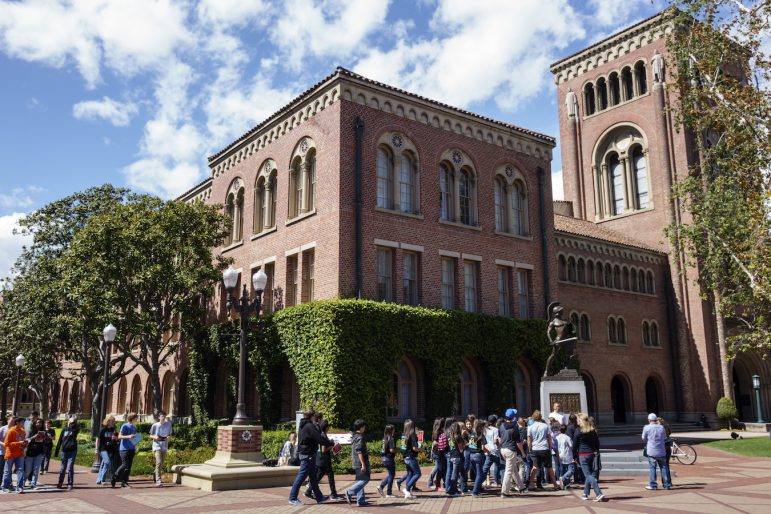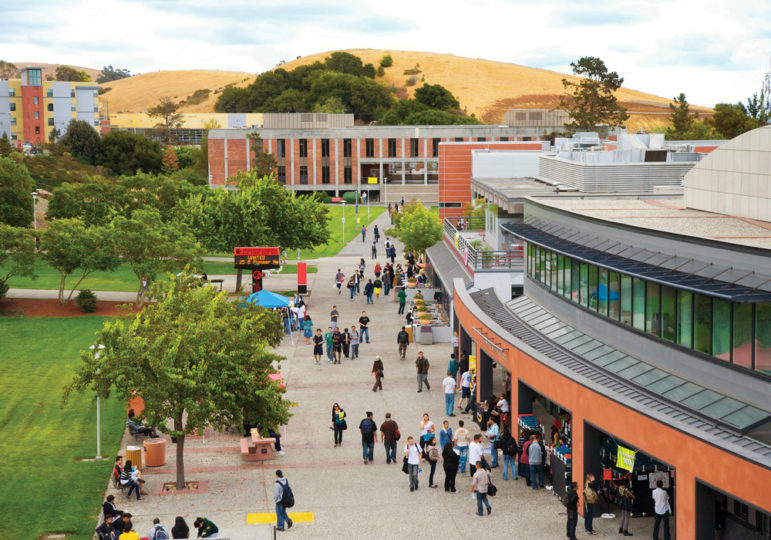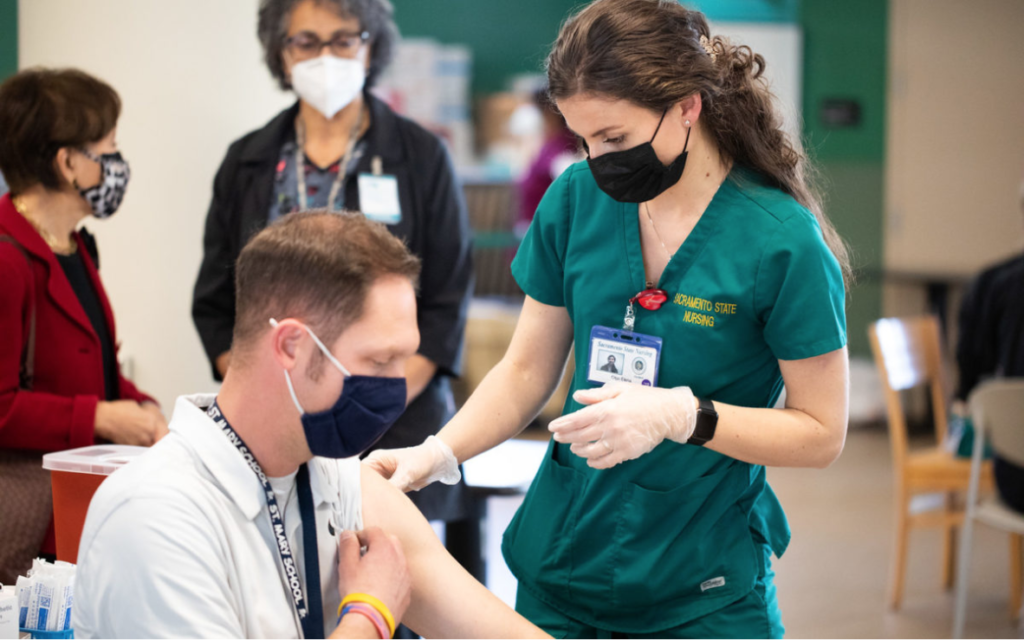Colleges and universities across California are making plans to require their students to be vaccinated for Covid-19 ahead of the fall term, but there are significant differences from one campus to the next.
Private universities like Chapman University and Loyola Marymount University are among the latest to announce such mandates, joining California’s public university systems and other private colleges throughout the state.
The vaccine requirements proposed by the University of California and California State University systems came with a notable caveat: They will only take effect if the Food and Drug Administration gives full approval to one of the existing vaccines, something not guaranteed to happen by the fall. The vaccine requirements at some private universities, including Chapman and the University of Southern California, also came with that caveat.
Many other universities in California and elsewhere are choosing to require that students be vaccinated for the fall even if no vaccine gets full FDA approval by then, and legal experts mostly agree that it’s within their right to do so. The vaccines are currently authorized for emergency use.
With UC and CSU among the universities that are waiting for full approval, it raises the possibility that their mandates won’t actually be in effect in the fall.
“It’s not something that is set in stone. We don’t have a crystal ball, and we don’t know when that’s going to happen,” said Mike Uhlenkamp, a spokesman for CSU’s systemwide chancellor’s office.
Neither UC nor CSU would clarify why they are waiting for full FDA approval.

It’s not clear how many of California’s 116 community colleges will require students to be vaccinated. The state chancellor’s office that oversees those colleges is leaving it up to local college leaders to decide whether to mandate vaccines.
Many students will get vaccinated regardless and, with Covid-19 case rates in California among the lowest in the country, it’s possible that large numbers of students and faculty will be back on campuses at California’s public colleges and universities this fall even if a mandate isn’t in place.
If full FDA approval doesn’t happen before the fall, individual campuses across the CSU system could still require that certain students be vaccinated, such as those living in dorms. Those decisions will be left to each of the campuses, Uhlenkamp said.
Uhlenkamp said the main intent of CSU’s announcement in April that a systemwide requirement would take effect after FDA approval was to make students and staff aware that a requirement would eventually be in place, even if it’s not imminent.
So far, the FDA has authorized emergency use for vaccines made by Pfizer-BioNTech, Moderna and Johnson & Johnson. For a vaccine to be given full approval, one of those manufacturers would need to submit what’s called a biologics license application to the FDA. Each of the manufacturers is still collecting data and has yet to seek full approval.
The American Council on Education, a trade group representing college and university presidents, wrote in an issue brief that “the legal right of institutions to require COVID-19 vaccination for students seems likely to be upheld” even under an emergency use authorization as long as they allow for medical and religious exemptions, which California’s colleges and universities plan to do.
Uhlenkamp acknowledged that there is no legal basis for waiting for full FDA approval.
Jeffrey Nolan, an attorney with the firm Holland & Knight, said the key reason that colleges can require students to be vaccinated — even before the vaccines get full approval — is because students aren’t being forced to attend.
“The idea is you can make your own choice about your personal or medical decisions, but if you’re choosing to be here and live in our residential community, then we can condition your continued participation on this thing,” he said.
Requiring Covid-19 vaccinations of students makes sense to Shaan Sheth, 20, a second-year student at UC Berkeley who studies industrial engineering and operations research.
Sheth said requiring vaccinations is especially important for campuses like Berkeley “that have students from all over the globe.” Berkeley enrolls about 31,000 undergraduates across all 50 states and 74 countries.
“I know that there are some students who may be afraid to get the vaccine, but I do think the school has everyone’s best interests and safety in mind, and there are alternate methods of instructions available for those not willing to get their vaccine,” Sheth said.
The decision of some universities to wait for full FDA approval could be moot if that happens before the fall. USC and UC have said they expect full approval to happen over the summer.

Others aren’t so sure.
“That’s not knowable,” said Yvonne Maldonado, a professor of infectious diseases at Stanford University. “That’s like if you had a term paper and there was no deadline and asking, when will you have that due?”
Outside of California, several public universities across the country have joined the many private colleges that will require students to be vaccinated this fall regardless of whether any vaccine is fully approved. That includes Montclair State University in New Jersey.
“After careful analysis, the university has concluded this is allowed under both federal and state law,” said Andrew Mees, a spokesman for Montclair State. “The science indicates that these vaccines are safe and effective.”
At Pomona College, a private college in Los Angeles County, administrators also determined that waiting for full approval wouldn’t be necessary.
“We felt that we were moving in alignment with many other organizations that are requiring the vaccination, and our student population and their families have largely been quite supportive,” said Avis Hinkson, that college’s dean of students.
Jeffrey Klausner, a professor of preventive medicine at USC’s Keck School of Medicine, called it a mistake for universities to wait for full approval.
“It may not be approved by September, and people need to get vaccinated now,” he said.
Many students will likely choose to get vaccinated on their own, regardless of a mandate.
Suraj Doshi, a second-year student at UCLA studying computational and systems biology, said he got vaccinated to keep himself and his family safe. He added that he thinks requiring the vaccine for students is a sensible step.
“It will keep those that are susceptible safe, and for others, it will simply be another vaccination,” he said. Already, universities require students to be vaccinated against illnesses such as measles and chickenpox.
Jaime Campos, 25, a third-year student at Cal State Los Angeles studying television and film, is already vaccinated. In Campos’ view, requiring Covid-19 vaccinations for students and staff is a necessity.
“In environments like college campuses that have thousands of students and staff meeting and using the same resources, it’s the safest step to take to prevent the virus from spreading not only to those on campus but also their families and everyone they might interact with at work or other environments,” Campos said.
With or without full FDA approval, it will be more complicated for universities to require that staff and faculty get vaccinated, legal experts said. Because many faculty members are tenured and many other employees are unionized, universities can’t easily impose new working conditions on them.
The CSU and UC systems both said they intend to require vaccinations for faculty and staff after full FDA approval. Uhlenkamp said the CSU chancellor’s office will collectively bargain with their faculty and other unionized staff before imposing that requirement.
He said the chancellor’s office chose to announce its intention to require that faculty and staff be vaccinated because, ultimately, having them vaccinated will be necessary for full campus reopenings.
Even if full FDA approval doesn’t happen before the fall term, it may still be safe for campuses to have significantly more in-person classes and students living on campus than they have had throughout the 2019-20 academic year.
Klausner, the professor of preventive medicine at USC, said whether wider reopenings would be safe without a vaccine requirement would depend on the spread of Covid-19 at the time.
“But at least in California, for many weeks now, we’ve seen very low numbers of cases, very low numbers of hospitalization, and very, very low deaths,” he said.
At CSU, with campuses stretching from the northernmost part of the state to San Diego, it will be left to each of the individual campuses and their local public health agencies to make those decisions, Uhlenkamp said.
“They will all feel a little better if there’s a vaccine requirement in place, but we’re up against a nebulous deadline in terms of the FDA approval,” he said.
Emily Chung, Taylor Helmes and Catherine Valdez contributed to this story. They are reporting interns with EdSource’s California Student Journalism Corps.
